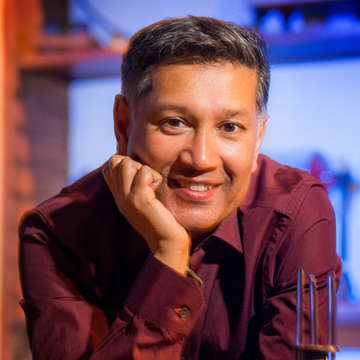2025 RSC prizes: Professor Islam & Professor Pasta

Image by The Faraday Institution
Two of our scientists have been recognised with Royal Society of Chemistry prizes for their pioneering work in energy storage and low-carbon technologies.
The prizes awarded are the Environment Prize and Medal to Professor Saiful Islam, and the Corday-Morgan Prize and Medal to Professor Mauro Pasta. They are among more than 40 prize winners recognised by the Royal Society of Chemistry (RSC) this year, in a programme celebrating exceptional contributions across the chemical sciences.
Professor Islam has been honoured for deepening our understanding of atomistic processes in materials for lithium batteries and hybrid photovoltaics, and Professor Pasta has been recognised for innovative research on novel battery chemistries that go beyond the current state-of-the-art in lithium-ion systems. They will receive £3,000 and £5,000 each respectively, along with medals.
Together, their work is helping to lay the scientific foundations for a cleaner, electrified energy future - from more efficient batteries to smarter solar technologies.
"I am delighted and very honoured to receive this award from the Royal Society of Chemistry. I would like to acknowledge the fantastic contributions from my research group - both past and present. I am also grateful for the fruitful and enjoyable research collaborations over many years, and the research funding support, largely from the EPSRC and the Faraday Institution".
Professor Saiful Islam
Professor Islam's research on low-carbon energy addresses one of the most urgent challenges of our time in tackling climate change. The next generation of green technologies depends on new materials and greater understanding. Professor Islam's research uses powerful computer modelling techniques to help develop next-generation lithium battery materials for electric vehicles and a new type of solar cell compound called perovskite. His research philosophy is to combine a deeper atomic-scale understanding of energy materials with experimental investigation.
"I'm deeply grateful to all current and former members of my research group, as well as to my colleagues and collaborators - this award is as much theirs as it is mine. I am truly fortunate to work alongside such a talented and diverse group of people. Looking at the list of past recipients, I feel a mix of pride, imposter syndrome, and a deep sense of responsibility to contribute meaningfully to science and to uphold the values of the Royal Society of Chemistry to the best of my ability".
Professor Mauro Pasta
Rechargeable batteries are essential to the global effort to reduce carbon emissions and to combat climate change. They power everything from electric vehicles to portable electronics, and are key to building a cleaner, more sustainable energy system. To support this shift, the UK Government has committed to establishing a strong battery supply chain to drive economic growth and to help the country reach its net-zero targets. Professor Pasta's research focuses on one of the least understood, but most important, parts of a battery: the electrolyte. This is the component that allows ions to move between the battery's electrodes during charging and discharging.
A major challenge lies in understanding the solid electrolyte interphase (SEI) - a nanometre-thin layer that forms where the electrolyte meets the electrodes. Although tiny, this layer has a huge impact on how well a battery performs, and how long it lasts. Through his work, Professor Pasta aims to uncover the structure and behaviour of the SEI and how it interacts with the electrolyte. By improving our understanding of this layer, we can design better and safer batteries that charge faster, last longer, and are more environmentally friendly. These advances will help bring next-generation battery technologies to market more quickly, supporting cleaner transport, more efficient renewable energy storage, and a more sustainable future for everyone.
"The chemical sciences cover a rich and diverse collection of disciplines, from fundamental understanding of materials and the living world, to applications in medicine, sustainability, technology and more. By working together across borders and disciplines, chemists are finding solutions to some of the world's most pressing challenges. Our prize winners come from a vast array of backgrounds, all contributing in different ways to our knowledge base, and bringing fresh ideas and innovations. We recognise chemical scientists from every career stage and every role type, including those who contribute to the RSC's work as volunteers. We celebrate winners from both industry and academia, as well as individuals, teams and the science itself.
Their passion, dedication and brilliance are an inspiration. I extend my warmest congratulations to them all".
Dr Helen Pain, Chief Executive of the Royal Society of Chemistry
The Royal Society of Chemistry's prizes have recognised excellence in the chemical sciences for more than 150 years. This year's winners join a prestigious list of past recipients in the RSC's prize portfolio, 60 of whom have gone on to win Nobel Prizes for their work, including 2022 Nobel Laureate Carolyn Bertozzi and 2019 Nobel Laureate John B Goodenough.
The Research and Innovation Prizes celebrate brilliant individuals from across industry and academia. They include prizes for those at different career stages in general chemistry and for those working in specific fields, as well as interdisciplinary prizes and prizes for those in specific roles. Other prize categories include those for volunteers, those in education (announced in November) and the Inclusion & Diversity Prize, and the Horizon Prize, which celebrate discoveries and innovations that push the boundaries of science.



